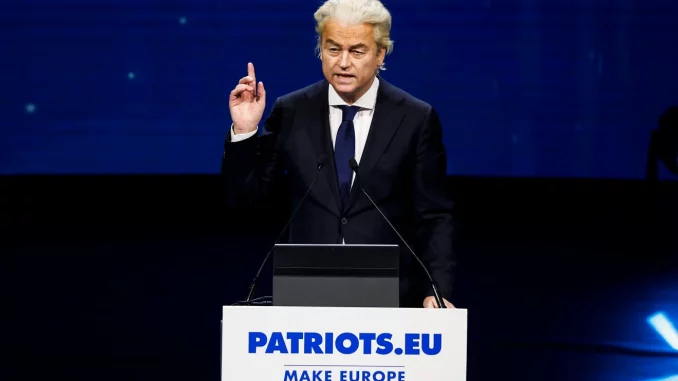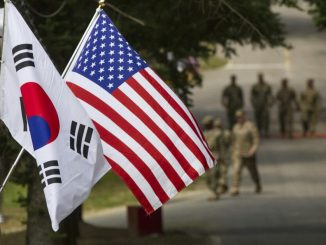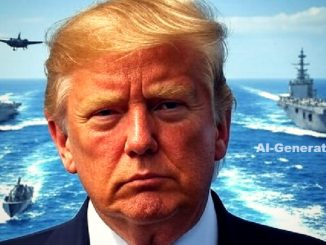
Dutch Party for Freedom leader Geert Wilders speaks during a Patriots for Europe rally in Madrid, Feb. 8, 2025. Photo by Pablo Blazquez Dominguez/Getty Images.
| Published August 11, 2025
Israel’s “fight is our fight since we cherish life and freedom while they [Hamas terrorists] love death and destruction,” the Dutch leader tweeted.
1. Geert Wilders: Rallying Europe’s Pro-Israel Base
Dutch politician Geert Wilders, leader of the right-leaning Party for Freedom (PVV), met with Israeli Prime Minister Benjamin Netanyahu in Jerusalem, delivering a message he insists reflects the sentiments of “millions and millions of Europeans.”
While acknowledging that many European political leaders and media outlets remain highly critical of Israel’s military actions in Gaza, Wilders said these voices do not speak for all. “Our politicians are weak, and the media is often biased,” he said, emphasizing that ordinary citizens across the continent still identify with Israel’s struggle as a fight for life and freedom in the face of death and destruction.
Wilders’ choice to make this statement in Israel carries symbolic weight. His visit serves as both a diplomatic gesture and a political statement—projecting solidarity at a time when European opinion is increasingly fractured over the conflict. His closing remark, “Am Israel Chai” (“The People of Israel Live”), reinforced his unwavering stance.
2. Benny Gantz: A Warning Against Rewarding Terror
On the other side of Israel’s political spectrum—but united in defending the nation’s security—Benny Gantz, former Israeli Defense Minister and a key member of the wartime unity government, addressed Western policymakers directly.
Speaking in response to recent international calls for the recognition of a Palestinian state and official condemnations of Israel’s ongoing military campaign in Gaza, Gantz argued that such measures, while perhaps intended to de-escalate tensions, risk doing the opposite.
“These actions reward terror and prolong the war,” he warned, pointing out that premature diplomatic concessions could harden Hamas’ negotiating position, make hostage recovery more difficult, and send a dangerous signal to other extremist groups. His remarks underscored a strategic concern: that well-meaning but poorly timed international pressure could compromise Israel’s security objectives and embolden its adversaries.
3. Europe’s Crossroads: Solidarity vs. Strategy
Wilders and Gantz reflect two different facets of the same challenge Israel faces on the international stage.
-
Wilders’ View: Public solidarity and moral clarity are vital in sustaining Israel’s position against Hamas and defending democratic values in the Middle East. His message appeals to a sense of shared cultural and security concerns between Israel and like-minded Europeans.
-
Gantz’s View: Strategic caution is essential—symbolic acts of recognition or condemnation may seem supportive or peace-oriented but can undermine Israel’s leverage in conflict resolution and counterterrorism.
Both perspectives capture the broader reality that Europe’s political climate is divided—not only between countries but within them. While some European leaders push for a more confrontational stance toward Israel, others quietly maintain security cooperation and diplomatic engagement.
4. The Larger Picture
This dynamic highlights a core tension in international diplomacy: the need to project unity with allies while also navigating the practical realities of an ongoing conflict. Israel, for its part, benefits from visible allies like Wilders, who counter anti-Israel narratives in global forums, yet also relies on measured strategic guidance from figures like Gantz, who focus on long-term security outcomes.
As the war continues, these two approaches—public solidarity and strategic caution—may both prove necessary to safeguard Israel’s position, influence global opinion, and shape the terms of any eventual resolution.
 Implications
Implications
Here’s a focused Implications section you can append to the feature article for deeper analytical weight:
-
European Political Polarization
Wilders’ strong pro-Israel stance illustrates that significant grassroots and political support still exists across Europe, despite the growing influence of pro-Palestinian activism and critical media coverage. However, the gulf between public sentiment in certain circles and the official positions of many European governments suggests that Israel cannot take diplomatic alignment for granted. -
Diplomatic Leverage at Risk
Gantz’s warning highlights a strategic vulnerability—Western recognition of Palestinian statehood or overt condemnation of Israeli operations, when made without preconditions, could reduce Israel’s leverage in negotiations, embolden Hamas, and complicate hostage recovery efforts. This creates a risk of prolonging hostilities rather than resolving them. -
Narrative Battleground
The contrasting approaches—Wilders’ moral solidarity and Gantz’s strategic caution—reflect the broader battle over how Israel’s narrative is framed internationally. Israel must manage both its military realities and its image abroad, ensuring that solidarity does not give way to diplomatic isolation. -
Potential for Policy Shifts
If pro-Israel European voices like Wilders gain more influence, it could strengthen political will in Europe to resist pressure campaigns targeting Israel. Conversely, if Gantz’s fears materialize and Western actions embolden Hamas, governments could adopt even more cautious or critical stances toward Israel, impacting military, economic, and security cooperation. -
Long-Term Regional Impact
The balance between public solidarity and strategic diplomacy will shape not only Israel’s immediate wartime posture but also its long-term security architecture in the region. Missteps now could have lasting consequences for deterrence, alliances, and stability in the Middle East.
 Overall Takeaway:
Overall Takeaway:
Europe’s relationship with Israel is at a pivotal juncture. Geert Wilders’ emphatic show of solidarity demonstrates that a significant bloc of Europeans still sees Israel’s fight as their own, grounded in shared values of security, freedom, and resilience. At the same time, Benny Gantz’s cautionary words remind both allies and critics that goodwill must be matched with strategic discipline—misplaced diplomatic pressure can inadvertently strengthen those who thrive on instability.
For Israel, the challenge lies in harmonizing these currents: leveraging the moral and political capital of allies like Wilders while navigating the delicate realities of global diplomacy outlined by Gantz. In the end, the success of Israel’s cause will depend not only on battlefield outcomes but also on its ability to keep friends close, adversaries in check, and the international narrative firmly rooted in truth and security.
SOURCES: JNS – Millions of Europeans support Israel, Wilders tells Netanyahu
THE JERUSALEM POST – Geert Wilders tells Netanyahu ‘millions of people in Europe support him’ during phone call
ALL ISRAEL NEWS – ‘Focus on Hamas’: Former Israeli Defense Minister Benny Gantz warns Western actions ‘reward terror’ and ‘prolong the war’






Be the first to comment